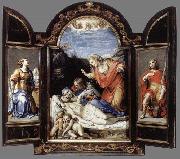La Peinture à l'huile en gros de Chine & Encadre |
|||||||||||

|
|||||||||||
|
|
|
||||||||||||||
|
CARRACCI, Annibale
Italian Baroque Era Painter, 1560-1609 |
||||||||||||||
|
|
||||||||||||||
|
||||||||||||||
|
|
||||||||||||||
| CARRACCI, Annibale
Italian Baroque Era Painter, 1560-1609 Triptych 1604-05 Oil on copper and panel, 37 x 24 cm (central panel), 37 x 12 cm (each wing) Galleria Nazionale d'Arte Antica, Rome The central panel shows the Piet? while on the wings St Cecilia (left) and St Ermenegildus are represented. This small triptych originally belonged to Cardinal Odoardo Farnese, and the Farnese inventories document it as a work of Annibale Carracci as early as 1619. The attribution to Annibale was unquestioned until 1956 when, for stylistic reasons, the tabernacle was assigned to the Carracci workshop and given specifically to the hand of Innocenzo Tacconi. Despite this, the general conception of the work was attributed to Annibale on the basis of a drawing preserved at the Louvre (Paris). More recently, the documentary research has proven that the painting was commissioned directly from the artist by Cardinal Farnese sometime after 1603, the year in which he was obliged to renounce his claims to the succession to the English throne. Considering the importance of the commission, it seems difficult to argue against attribution to Carracci himself. The high quality of the Piet?and stylistic comparison of this central panel to Annibale's many other treatments of the subject lead to the assignment of this part of the execution to the master. It is, however, possible that Annibale allowed assistants (Innocenzo Tacconi or Antonio Carracci) to work on secondary panels, as these are slightly different in some of the details of execution.Artist:CARRACCI, Annibale Title: Triptych Painted in 1551-1600 , Italian - - painting : religious 1604-05 Oil on copper and panel, 37 x 24 cm (central panel), 37 x 12 cm (each wing) Galleria Nazionale d'Arte Antica, Rome The central panel shows the Piet? while on the wings St Cecilia (left) and St Ermenegildus are represented. This small triptych originally belonged to Cardinal Odoardo Farnese, and the Farnese inventories document it as a work of Annibale Carracci as early as 1619. The attribution to Annibale was unquestioned until 1956 when, for stylistic reasons, the tabernacle was assigned to the Carracci workshop and given specifically to the hand of Innocenzo Tacconi. Despite this, the general conception of the work was attributed to Annibale on the basis of a drawing preserved at the Louvre (Paris). More recently, the documentary research has proven that the painting was commissioned directly from the artist by Cardinal Farnese sometime after 1603, the year in which he was obliged to renounce his claims to the succession to the English throne. Considering the importance of the commission, it seems difficult to argue against attribution to Carracci himself. The high quality of the Piet?and stylistic comparison of this central panel to Annibale's many other treatments of the subject lead to the assignment of this part of the execution to the master. It is, however, possible that Annibale allowed assistants (Innocenzo Tacconi or Antonio Carracci) to work on secondary panels, as these are slightly different in some of the details of execution.Artist:CARRACCI, Annibale Title: Triptych Painted in 1551-1600 , Italian - - painting : religious |
||||||||||||||
|
Related Paintings to CARRACCI, Annibale :. |
||||||||||||||
|
|
||||||||||||||
|
|
||||||||||||||
|
CONTACTER DES Etats-Unis |







